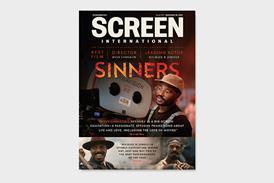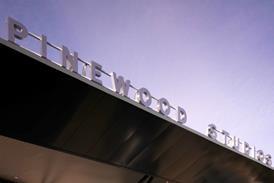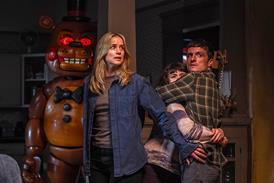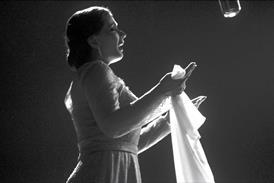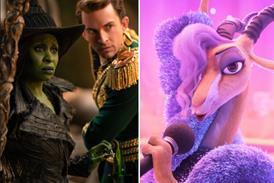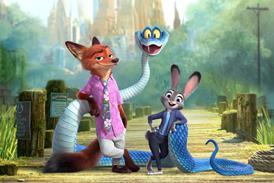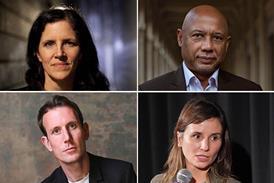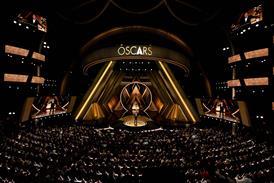Dir/sc: James Gray. US, 2016. 140 mins.
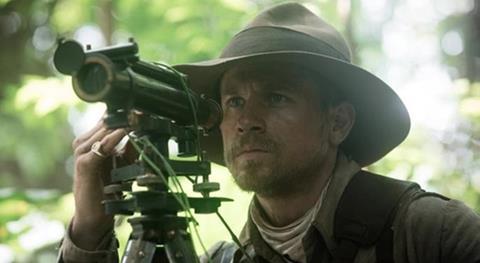
It’s unsurprising that The Lost City Of Z was chosen to close the New York Film Festival. James Gray’s spectacular adventure biopic about British explorer Percy Fawcett’s (Charlie Hunnam) obsessive search for the site of an ancient civilization in Amazonia is a richly atmospheric true-life Boy’s Own tale. Exuding an incongruously modern disgust with racism, classism, sexism, jingoism, and authoritarianism, as well as an implicit environmentalist vibe, Lost City is the acme of a 21st century prestige picture.
Angus Macfadyen’s greedy, self-pitying Murray injects a welcome dose of vice into the film
Sadly, however, it is one that is also deeply flawed. Gray’s most ambitious movie yet is marred by a story arc that fails to rise or reach a climax, unnatural-sounding expository dialogue, and an unforgivable lack of thrills. There’s a real danger that the movie may underachieve commercially when it opens in April next year through the Amazon Studios/Bleeker Street partnership.
A startling foray from the stifling urban jungle of Gray’s previous six features, Lost City was adapted by him from David Grann’s 2009 non-fiction book about Fawcett’s nearly 20-year quest which apparently ended with the disappearance in 1925 of the 58-year-old explorer, his 21-year-old son Jack, and Jack’s best friend Raleigh Rimell in the Upper Xingu region of Brazil.
The film focuses on three of Fawcett’s seven expeditions to the South American rainforest untertaken between 1906 and 1924, making a detour to the Western Front in 1916.
The tale-within-the-tale that anchors Lost City, however, is about male love, namely the Platonic friendship between Fawcett and his fellow explorer Henry Costin (a bearded and bespectacled Robert Pattinson) and the conflicted father-son bond between Fawcett and his eldest son Jack (played as a 21-year-old by Tom Holland). Pattinson’s nuanced portrayal of the taciturn Costin indicates that his willingness to endure so much hardship in the rainforest stems from intense loyalty to his chief. Jack’s switch from being a petulant neglected adolescent to budding explorer himself also rings true psychologically, although it occurs too abruptly.
Most of the action sequences are lacklustre, however. An arrow attack by hidden Indians on Fawcett, Costin and their small crew as they travel by river near the Peru-Bolivia border pales beside the equivalent in Apocalypse Now, as does a scene showing a ferocious big cat primed to spring. In contrast, the British infantry charge Fawcett leads across no-man’s land at the Somme recalls the indelible Omaha Beach landing in Saving Private Ryan.
Despite Charlie Hunnam’s blazing portrayal of Fawcett – a comet of a man, evangelical in his belief that an ancient city and source of theosophical wisdom exists in the Matto Grosso region of Brazil – his wanderlust remains largely unexplained. His formative search for treasure in Ceylon might have made for a more compelling episode than the 1912 journey to the rainforest with the aristocratic explorer James Murray who briefly serves as Fawcett’s antagonist. Angus Macfadyen’s greedy, self-pitying Murray does, however, inject a welcome dose of vice into the film.
The screenplay empathises with Fawcett’s wife Nina (Sienna Miller), a self-proclaimed “independent woman” ironically chained to domesticity as a virtual single parent to their three children. Miller turns in a typically classy performance, though the narrative strand involving her feels inorganic.
An account of Fawcett’s South American travels that didn’t strive for political correctness, that was steeped more in the brutal imperial-capitalistic realpolitik of the 20 years centering on the 1914-18 cataclysm, might have made for a more harshly truthful experience. Darius Khondji’s cinematography is magnificent, yet it seems irrelevant how visually stunning a movie is – and Lost City is sprinkled with strange, haunting images corroborating Fawcett’s belief that Brazil’s “primordial” natives were aesthetically and spiritually sophisticated – if it doesn’t harrow, enlighten, or move audiences.
Production companies: Keep Your Head, MICA Entertainment, MadRiver Pictures, Plan B Entertainment
International sales: Sierra Affinity, info@sierra-affinity.com
US distribution: Amazon Studios, Bleecker Street
Producers: Dede Gardner, Jeremy Kleiner, Anthony Katagas, James Gray, Dale Armin Johnson
Executive producers: Brad Pitt, Marc Butan, Glenn Murray, Julie May, Mark Huffam, Felipe Aljure
Screenplay: James Gray, based on the book by David Grann
Cinematography: Darius Khondji
Production design: Jean Vincent-Puzos
Editors: John Axelrad, Lee Augen
Music: Christopher Spelman
Main cast: Charlie Hunnam, Robert Pattinson, Sienna Miller, Tom Holland, Edward Ashley, Angus Macfadyen, Ian McDiarmid, Clive Francis, Pedro Coello, Aleksndar Jovanovic, Elena Solovey, Franco Nero

